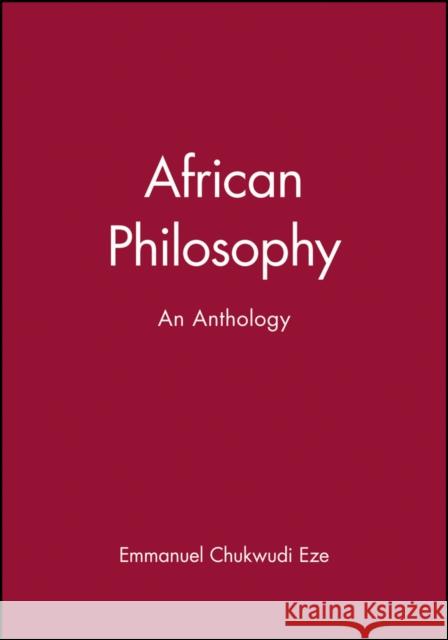African Philosophy » książka



African Philosophy
ISBN-13: 9780631203384 / Angielski / Miękka / 1998 / 512 str.
African Philosophy
ISBN-13: 9780631203384 / Angielski / Miękka / 1998 / 512 str.
(netto: 212,12 VAT: 5%)
Najniższa cena z 30 dni: 217,14 zł
ok. 22 dni roboczych.
Darmowa dostawa!
Bringing together canonical philosophical texts from African, African-American, Afro-Caribbean, and Black European thinkers, this major new anthology is designed to serve both as a textbook and as the authoritative reference volume in Africana philosophical and cultural studies.
"This powerful and wide ranging anthology is ideal for classroom use. The issues discussed are central: the selections are engaging; and the contributors are of the highest order. It will help bring about a long overdue change in the philosophical canon." Robert Bernasconi, University of Memphis
"We are indeed blessed to have Eze′s wide–ranging and magnificent anthology. It brings together some of the most stimulating texts of African, African–American, Afro–Caribbean, and Black European philosophy. Its ambitious effort will serve well all those interested in African studies and students and specialists of philosophy in general." V. Y. Mudimbe, Stanford University
Preface.
Acknowledgements..
Part I: What is African Philosophy?.
1. African Philosophy: Yesterday and Today (Joseph I. Omoregbe).
2. Philosophy and Post–Colonial Africa (Tsenay Serequeberhan).
3. African, African American, Africana Philosophy (Lucius Outlaw).
4. The African Foundations of Greek Philosophy (Henry Olela).
5. Contemporary Moslem Philosophies in North Africa (Mourad Wahba).
Part II: Human Nature: Mind, Body, and Self–Identity.
6. The Relation of Okra (Soul) and Honam (Body): An Akan Conception (Kwame Gyekye).
7. "Chi" in Igbo Cosmology (Chinua Achebe).
8. The Sociality of Self (Okot p′Bitek).
Part III: Philosophy, Politics, and Society.
9. Leaders must not be Masters (Julius Nyerere).
10. Consciencism (Kwame Nkrumah).
11. Two Traditions in African American Political Philosophy (Bernard Boxill).
12. Universal Dimensions of Black Struggle I: Black Revolution Universal Dimensions of Black Struggle II: Human Rights, Civil Rights (Malcom X).
13. Philosophy, Politics, and Power: An Afro–American Perspective (Cornel West).
Part IV: Ethics.
14. "Mutumin Kirki": The Concept of the Good Man in Hausa (Anthony H.M. Kirk–Greene).
15. Yoruba Philosophy: Individuality, Community, and the Moral Order (Segun Gbadegesin).
16. Concerning Violence (Frantz Fanon).
17. Morals and the Value of Human Life (M.M. Agrawal).
18. Moral Reasoning versus Racial Reasoning (Cornel West).
Part V: On Knowledge and Science.
19. Elements of Physics in Yoruba Culture I.
Elements of Physics in Yoruba Culture II (Supo Ogunbunmi and Henry M. Olaitan).
20. "Divination": A Way of Knowing (Philip M. Peek).
21. The Problem of Knowledge in "Divination": The Example of Ifa (E. Chukwudi Eze).
22. The Concept of Truth in the Akan Language (Kwasi Wiredu).
23. African Traditional Thought and Western Science (Robin Horton).
24. How Not to Compare African Thought with Western Thought (Kwasi Wiredu).
25. Literacy, Criticism, and the Growth of Knowledge (Jack Goody).
Part VI: Philosophy and Colonial Encounter.
26. Modern Western Philosophy and African Colonialism (E. Chukwudi Eze).
27. Discourse on Colonialism (Aime Cesaire).
28. The Wretched of the Earth (Frantz Ganon).
29. Colonialism and the Colonized: Violence and Coutner–Violence (Tsenay Serequeberhan).
30. Cultural Nationalism in the Colonial Period (R. L. Okonkwo).
31. National Liberation and Culture (Return to the Source) (Amilcar Cabral).
Part VII: Philosophy and Race.
32. The Conservation of Races (W. E. B. Du Bois).
33. The Illusions of Race (Kwame Anthony Appiah).
34. Du Bois on the Invention of Race (Tommy L. Lott).
35. Racism and Culture (Frantz Fanon).
36. Racism and Feminism (Bell Hooks).
Part VIII: Philosophy and Gender.
37. The Woman Question: African and Western Perspectives (Marie Pauline Eboh).
38. Black Women: Shaping Feminist Theory (Bell Hooks).
39. Mammies, Matriarchs, and Other Controlling Images 9Patricia Hill Collins).
40. The Erasure of Black Women (Elizabeth V. Spelman).
41. The Curious Coincidence of Feminine and African Moralities Sandra Harding).
Part IX: Philosophy and Transatlantic African Slavery.
42. The Nature of Slavery (Fredrick Douglas).
43. The Concept of Slavery (Winthrop D. Jordan).
44. The Origin of Negro Slavery (Eric Williams).
45. The Interesting Narrative (Olaudah Equiano).
46. Thoughts and Sentiments on the Evil of Slavery (Ottobah Cugoano).
47. Autobiographical Acts and the Voice of the Southern Slave (Houston A. Baker, Jr.).
Part X: Ontology and the Nature of Art.
48. Breath (Birago Diop).
49. Bantu Ontology (Placide Tempels).
50. The Igbo World and Its Art (Chinua Achebe).
51. The Fourth Stage: Through the Mysteries of Ogun to the Origin of Yoruba Tragedy (Wole Soyinka).
52. The Duke′s Blues (Stanley Crouch).
Part XI: Philosophy of Religion.
53. God, Faith, and the Nature of Knowledge (Zera Yacob).
54. Must God Remain Greek (Robert E. Hood).
55. The Problem of Evil: An Akan Perspective (Kwame Gyekye).
56. Black Women and Men: Partnership in the 1990s (Bell Hooks and Cornel West).
Index.
Emmanuel Chukwudi Eze is Associate Professor of Philosophy at Bucknell University. His teaching and research interests are in critical social theory, modern European philosophy, and Africana philosophy. His publications include Postcolonial African Philosophy: A Critical Reader (1997), and Race and the Enlightenment (1996), both with Blackwell Publishers.
Bringing together canonical philosophical texts from African, African–American, Afro–Caribbean, and Black European thinkers, this major new anthology is designed to serve both as a textbook and as the authoritative reference volume in Africana philosophical and cultural studies.
The texts collected here also have enormous historical range: from traditional to modern, pre–colonial through colonial to post–colonial; and from the slave period through emancipation and the Civil Rights movements to the postmodern. In so doing, they represent a variety of cultural and ideological viewpoints, including secular, feminist, Christian, Islamic, and animist perspectives.
The volume will be useful for all those in gender and race theory as well as cultural, post–colonial, and black studies.
1997-2025 DolnySlask.com Agencja Internetowa
KrainaKsiazek.PL - Księgarnia Internetowa









